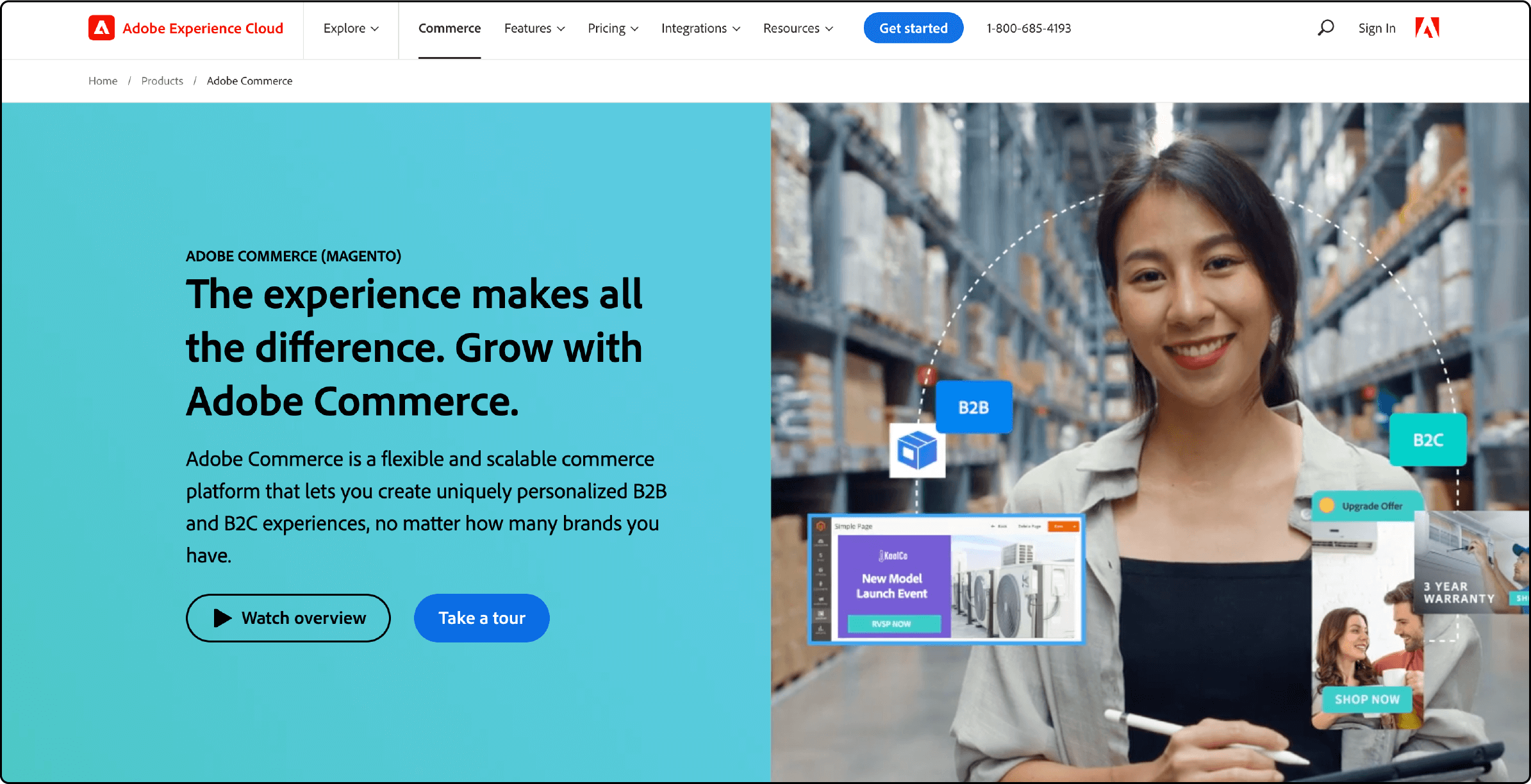
Why Choose Adobe Commerce Cloud vs. Magento Open Source?
Adobe Commerce Cloud is a fully managed cloud-based platform-as-a-service (PaaS). It allows for quick deployment of secure and scalable web storefronts. It comes with managed Magento hosting and pre-provisioned infrastructure. This article discusses the features of Adobe Commerce Cloud and how it can help businesses achieve their e-commerce goals.
Key Takeaways
-
Delve into Adobe commerce cloud, a fully managed cloud-based platform for e-commerce.
-
Benefits of Adobe Commerce Cloud include rapid deployment, secure web storefronts, and pre-provisioned infrastructure.
-
Adobe Commerce Cloud provides managed Magento hosting, streamlining your online business operations.
-
Adobe Commerce Cloud is suitable for businesses of all sizes looking to achieve their e-commerce goals.
-
Compare Adobe Commerce Cloud with Magento Open Source.
What is Adobe Commerce Cloud?

Adobe Commerce Cloud is a cloud-based Magento hosting platform. It includes cloud servers from Amazon Web Services (AWS) and Microsoft Azure. It is a fully managed platform that handles all infrastructure management tasks, allowing businesses to focus on their e-commerce operations.
Why Use Magento 2 Commerce Cloud Edition?
Adobe Commerce Cloud is built on top of Magento 2, the leading Magento e-commerce platform for B2B and B2C businesses. Its many features and capabilities make it an ideal solution for building online stores.
Magento 2 Commerce Cloud Edition is a managed and automated hosting platform specifically designed for cloud solutions. It serves as the self-hosted edition of Magento, sometimes called Magenta commerce, offering users an alternative platform with robust capabilities.
-
High Scalability: The platform exhibits exceptional scalability, seamlessly accommodating businesses of all sizes, positioning it as a top-tier eCommerce platform.
-
Enhanced Security: Magento Commerce Cloud offers a secure and scalable web storefront. It safeguards against XSS attacks, data breaches, and other security risks. With the Web Application Firewall (WAF) providing an extra layer of protection, your store stays PCI compliant. It thwarts malware inputs, injection attacks, and other OWASP Top Ten security threats.
-
Fully configured environment: No need to stress over server configuration, PHP, or database software compatibility. Adobe Commerce Cloud makes server management simple. It includes everything you need to host Magento on the cloud.
-
Continuous Deployment: Switching online stores allows for automatic deployment of changes, saving time and minimizing the risk of errors and downtime associated with manual deployment.
Adobe Commerce Cloud vs Magento 2 Open Source
Magento 2 is available with an Open Software License, allowing businesses and developers to adapt and personalize the software according to their requirements. On the other hand, Adobe Commerce Cloud is a high-quality, paid, and managed ecommerce solution that provides both on-premises and cloud-based options.
Let's take a closer look at this comparison table:
| Features | Adobe Commerce Cloud | Magento 2 Open Source |
|---|---|---|
| Hosting Type | Cloud-based (Amazon Web Services and Microsoft Azure) | Self-hosted |
| Pricing | Starts at $40,000 per year | Free |
| Scalability | Highly scalable | Scalable |
| Security | Advanced security features | Basic security features |
| Integrations | Wide range of integrations | Limited integrations |
| Business Intelligence | Yes | No |
| Content Delivery Network | Fastly | None (but can be added from an external managed-Magento hosting provider) |
| Command Line Interface | Magento Cloud CLI | None (but you may also add it from an external managed-Magento hosting provider) |
Top 15 Features of Adobe Commerce Cloud
1. Cloud-Based Architecture

Magento Commerce Cloud utilizes cloud-based servers from Amazon Web Services and Microsoft Azure. It offers high scalability and can handle even the most demanding workloads.
The cloud-based architecture also ensures high availability, ensuring your store stays online even during peak shopping seasons.
2. Content Staging

Magento content staging in Adobe Commerce Cloud makes planning, scheduling, and previewing site updates easier. With this feature, you can create and test new content directly on the production environment without affecting customer experience. It enables merchants to manage promotions, categories, and products with ease.
3. Business Intelligence and Reporting

Magento Commerce Cloud offers sophisticated business intelligence functionalities, providing an in-depth understanding of customer behavior, product performance, and sales analytics.
The reporting feature gives merchants a holistic view of their business and makes data-driven decisions to optimize sales and revenue.
4. New Relic Support

Magento Commerce Cloud provides users access to New Relic, an application performance management tool called APM. This tool collects and analyzes data to enhance the efficiency of interactions among different projects. It also helps to identify and solve potential performance issues before they occur.
5. Content Delivery Network

Magento 2 Cloud utilizes Fastly as its content delivery network (CDN), ensuring the fast and dependable delivery of Magento content to customers. With Fastly's global network, merchants can provide customers with a seamless shopping experience regardless of location.
6. Command-Line Interface

Magento Commerce Cloud provides a command-line interface called the Magento Cloud CLI. This powerful tool allows you to execute regular and automated tasks efficiently. It also simplifies the deployment process and enables advanced development workflows.
7. Infrastructure Level 99.9% SLA
With Adobe Commerce Cloud, merchants can expect a 99.9% Service Level Agreement (SLA) on the infrastructure level. This ensures that your website is up and running with minimal downtime, providing a reliable shopping experience for customers.
8. Application Level 99.9% SLA
In addition to the infrastructure level SLA, Adobe Commerce Cloud guarantees a 99.9% SLA for the application level. This means that merchants can always rely on the stability and performance of their websites, resulting in higher customer satisfaction and increased sales.
9. 30-minute SLT for P1
For critical issues, Adobe Commerce Cloud offers a 30-minute Service Level Target (SLT) for Priority 1 (P1) incidents. It means that in case of any P1 issue, the support team will respond within 30 minutes to provide assistance and resolve the issue as quickly as possible.
10. Planned Event Management Support
With Adobe Commerce Cloud, you can easily plan and manage events on your website, such as product launches or sales promotions.
The platform supports organizing and executing these events seamlessly, ensuring they run smoothly without technical glitches.
11. Custom Site Monitoring & Personalized Run Book

Adobe Commerce Cloud provides each merchant with personalized site monitoring and a customized runbook. This allows merchants to have complete visibility into their website's performance and quickly identify any issues that may arise.
12. Upgrade & Patching Development Assistance
With regular upgrades and patching, Adobe Commerce Cloud ensures your website runs on the latest version, providing enhanced security and improved features. The platform also provides development assistance to merchants during the upgrade process, making it a hassle-free experience.
13. Go-live Process Coaching

The platform offers go-live process coaching for merchants new to Adobe Commerce Cloud to ensure a smooth transition. This includes guidance on setting up and configuring the platform and best practices for managing your online store.
14. Dedicated Escalation Management
In case of any urgent issues or escalations, Adobe Commerce Cloud has a dedicated team to handle and resolve them promptly. This ensures merchants can always rely on the platform for quick and efficient support.
15. Application Monitoring Assistance

Adobe Commerce Cloud offers application monitoring assistance to help merchants keep track of their website's performance.
This includes real-time visibility into traffic, uptime, and user activity, allowing merchants to analyze and optimize their sites for better results.
The Architecture of Adobe Commerce Cloud
1. Cloud infrastructure
Magento commerce cloud utilizes cloud servers based on Amazon Web Services and Microsoft Azure. These servers offer high-performance computing, storage, and networking capabilities, enabling seamless scalability for enterprise-level eCommerce platforms.
2. Platform as a service (PaaS)
Adobe Commerce Cloud follows a PaaS model, giving users a fully managed website building and hosting environment. No need to fret about infrastructure management. Magento Commerce Cloud employs Git and Composer to manage and deploy Magento website code.
3. Magento Commerce functions
The Magento Commerce software provides all the necessary commerce functionality, advanced business intelligence, and B2B features. However, these additional features are unavailable in the Magento Open-Source version, also known as Magento Community.
4. Performance tools
Besides seamless scalability, Adobe Commerce Cloud offers performance tools such as Fastly CDN and New Relic APM. Fastly CDN ensures quick delivery of website content to global users, while New Relic APM monitors and identifies potential errors in real time. Magento Commerce Cloud provides developers and system admins access to New Relic, a tool that assists in monitoring and troubleshooting the infrastructure.
5. Security
Adobe Commerce Cloud implements DDoS protection, WAF (Web Application Firewall), and two-factor authentication to ensure secure transactions.
10 Factors to Consider When Choosing between Adobe Commerce Cloud & Magento Open Source
1. Business Goals and Needs
When considering your business needs and goals, consider your company's size. Large enterprises usually prefer Adobe Commerce Cloud, while Magento Open Source is more suitable for small to medium-sized companies. Evaluate the complexity of your products and services and determine if you require advanced features or customization.
2. Budget
Adobe Commerce Cloud is a high-end product, so you'll need a bigger budget for licensing and usage fees of more than $40,000. On the other hand, Magento Open Source is free and open-source, but you still have to consider expenses for hosting, development, security, and possible extensions. So, open-source is a better option for small businesses, while large businesses should choose plan as per their gross merchandise value.
3. Total Cost of Ownership (TCO)
To grasp the complete financial effect, compute the total cost of ownership (TCO) across time. This encompasses initial setup, licensing or hosting expenses, development costs, and continuous maintenance.
4. Integration Capabilities
Evaluate the systems and tools required for integration with your e-commerce platform. Adobe Commerce Cloud offers seamless integration with Adobe products, while both platforms offer ample integration options with third-party apps and services.
5. Scalability
When considering your business growth, consider the tailored solutions offered by Adobe Commerce Cloud for large enterprises and the suitability of Magento Open Source for smaller to medium-sized businesses with projected growth.
6. Support and Maintenance
To assess your technical expertise, consider the support options offered by Adobe Commerce Cloud and Magento Open Source. Adobe Commerce Cloud provides dedicated support and handles updates and maintenance, while Magento Open Source relies on community support and may require more technical skills or third-party support services.
7. Marketing and Analytics
When deciding on the marketing features you require, consider the level of sophistication you need. Adobe Commerce Cloud offers advanced marketing tools and AI-powered features for personalized experiences. On the other hand, Magento Open Source provides basic marketing features but might require additional extensions for more advanced capabilities.
8. Magento Hosting
Choose between a fully hosted solution or managing your Magento hosting. Adobe Commerce Cloud provides hosting, automatic updates, and enhanced security. Magento Open Source allows you to select your hosting provider, giving you greater control over server specifications and costs.
9. User Experience
Evaluate the platform's user interface. A dashboard that is easy to navigate and an intuitive design contribute to efficient store management and elevate the overall customer experience.
10. Magento Security
While both platforms prioritize security, Adobe Commerce Cloud offers additional security features and regular updates due to its premium status.
FAQs
1. What are some key features of Adobe Commerce Cloud and Magento 2 Open Source?
Adobe Commerce Cloud stands out with its advanced security features, high scalability, wide range of integrations, and indispensable business intelligence. Magento 2 Open Source, on the other hand, offers basic security features and is scalable, but its integrations are more limited, and it does not offer business intelligence.
2. How do hosting types and pricing differ between Adobe Commerce Cloud and Magento 2 Open Source?
Adobe Commerce Cloud is cloud-based, hosted on Amazon Web Services and Microsoft Azure. Pricing depends on expected annual gross sales revenue. In contrast, Magento 2 Open Source is a self-hosted solution that is free to use.
3. How do Adobe Commerce Cloud and Magento 2 Open Source cater to customization and SEO optimization?
Adobe Commerce Cloud provides robust customization options, mobile responsive design, and SEO optimization tools to maximize digital marketing integration. Magento 2 Open Source is also customizable and mobile responsive, but its SEO optimization capabilities are comparatively basic.
4. Which CDN and CLI does Adobe Commerce Cloud have?
Adobe Commerce Cloud uses Fastly CDN for its Content Delivery Network and has Magento Cloud CLI for its Command Line Interface. Magento 2 Open Source, however, does not provide it either.
5. How does Adobe Commerce Cloud support inventory management and scaling commerce experiences?
Adobe Commerce Cloud offers advanced features for inventory management, allowing businesses to scale their commerce experiences confidently. It also supports seamless integrations with various marketplaces and shipping services to ensure efficient end-to-end order fulfillment.
6. Can Adobe Commerce Cloud be used for content-as-a-service (CAAS), and what kind of customer experience can it provide?
Adobe Commerce Cloud can be used as a CAAS platform. Its content-type product page and its ability to help unique digital brands create enriched personalized customer experiences. It also supports XL spacing and style for better product display, enhancing the customer experience.
Summary
When deciding between Adobe Commerce Cloud and open-source, consider your business's needs, budget, and development resources. Consider factors such as pricing and scalability when determining the optimal solution for your business.
Open-source platforms are a compelling option for companies in search of cost-effective solutions. They offer more affordable hosting than Adobe Commerce's $22,000 yearly licensing fee and $40,000 for Adobe Commerce Cloud. With open-source platforms, store owners can enjoy better hosting at a significantly lower cost.
Choosing a managed Magento hosting company with data centers in your target market can greatly improve loading times.



